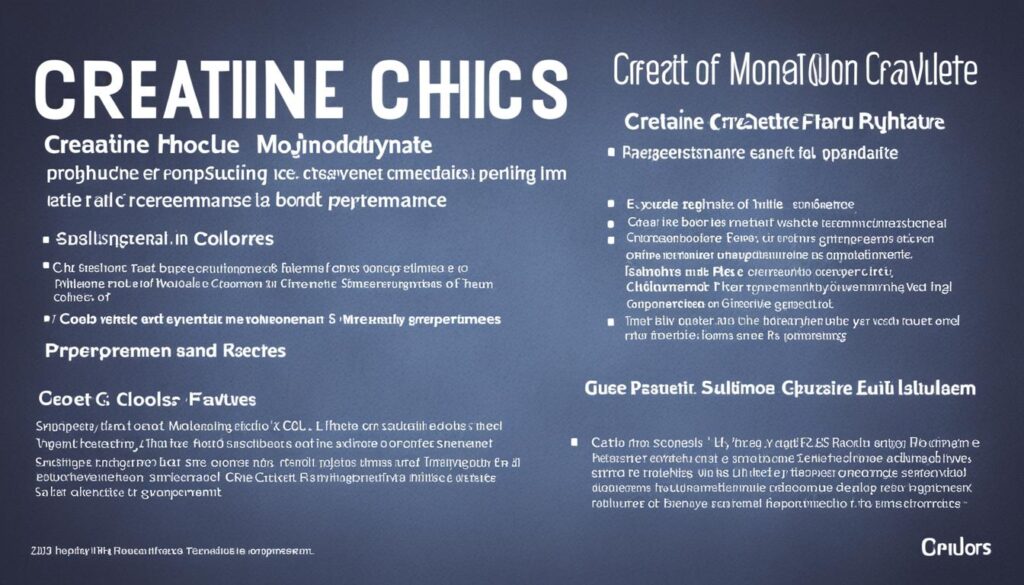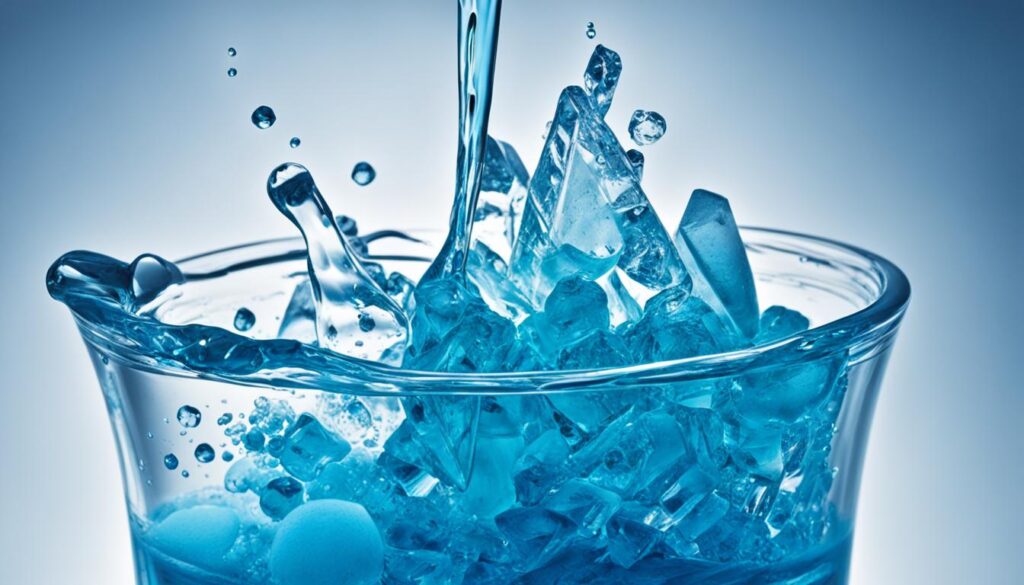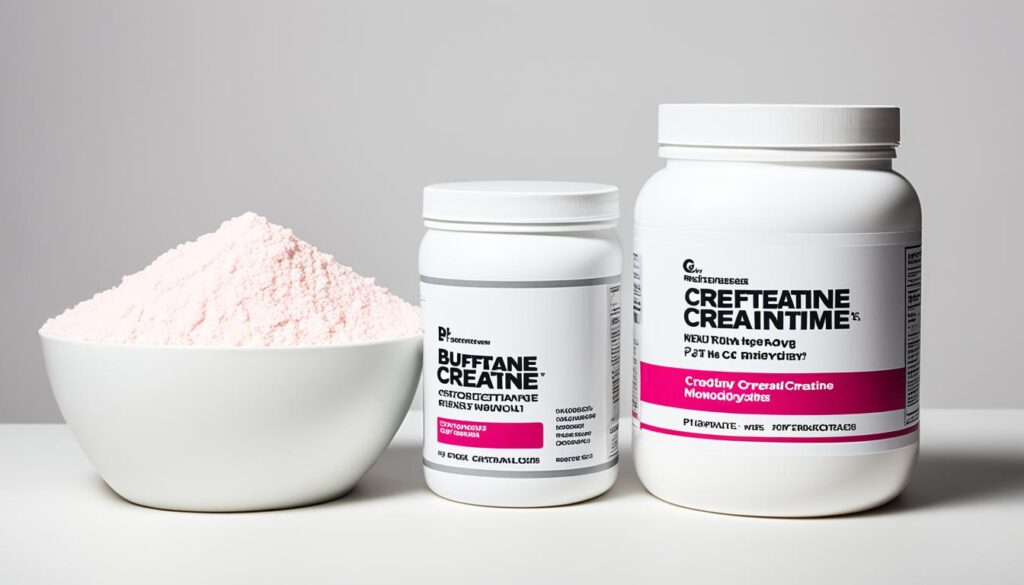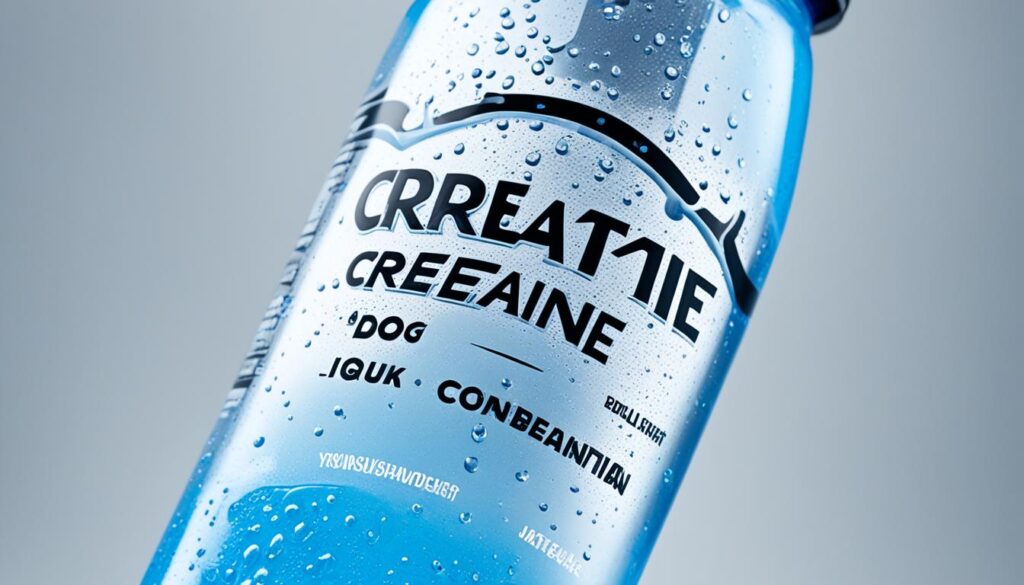An astonishing 76% of elite athletes across various sports rely on performance-enhancing supplements, with creatine topping that list as the most favored, according to recent surveys. This molecule, which mirrors the behavior of amino acids, is naturally synthesized in our bodies and has gathered significant attention not just for enhancing athletic prowess but also for its potential in disease prevention. My quest to dissect the best creatine for athletes leads me through the labyrinth of benefits of creatine supplements, putting each type under a microscope to reveal its unique contribution to amplifying athletic performance.
As I explore creatine supplementation for athletes, I will unravel the intricate details of six well-researched forms of creatine. My purpose here is twofold: to inform fellow athletes about their options and to distill the information down to actionable insights that could very well be the game-changer in an athlete’s regimen.
Key Takeaways
- Creatine is a significant boon for athletes seeking enhanced performance and energy.
- Understanding the different types of creatine helps in choosing the right supplement for individual athletic needs.
- Creatine supplementation is backed by extensive research highlighting its benefits in strength and endurance.
- My assessment of creatine includes the potential mental and physical advantages it offers to sports performance.
- Expect a deep dive into the six most researched creatine types, each promising to be the best creatine for athletes.
- I will shed light on the veracity behind the performance-enhancing supplements claims surrounding each creatine variant.
An Introduction to Creatine and Its Athlete Benefits
As an avid fitness enthusiast, I’ve always been keen on exploring effective supplements that boost my performance. Creatine has repeatedly proven to be a powerhouse when it comes to enhancing muscle strength and endurance. Serving as a critical player in the high-energy demands of intensive workouts, creatine’s ability to convert ADP to ATP offers the extra energy needed to propel my training sessions. Noting an approximately 10% increase in strength, particularly with resistance training, I find it’s not just about using creatine, but knowing how to choose the right creatine for performance.
Upon sifting through numerous studies, I’ve found that getting started with a creatine loading phase is a common strategy to quickly elevate muscle creatine levels. This is followed by a maintenance phase, which supports performance longevity. The journey of selecting a suitable type of creatine is nearly as important as the regimen itself. With numerous options on the market, I aim to provide clarity by comparing various creatine types in subsequent sections, outlining their unique benefits for sports performance.
Through personal trial and research, it is clear that the efficacy of any creatine supplement is not universal — it varies based on individual athletic goals and workout intensities.
- Understanding the role of creatine in energy production
- Identifying the impact of creatine on muscle strength and endurance
- Examining the criticality of the creatine loading and maintenance phases
- Evaluating available creatine types for tailored sports performance
Now, let’s consider the key attributes to look for when choosing a creatine supplement:
| Aspect | Importance |
|---|---|
| Purity | Ensures maximum absorption and efficiency |
| Form | Influences solubility and digestion |
| Dosage | Maintains steady creatine levels without causing waste |
| Additives | Affects overall product quality and potential side effects |
| Brand Reputation | Impacts reliability and consumer trust |
Note: The effectiveness of creatine can also depend on external factors such as diet and hydration levels. Thus, it is crucial to integrate any chosen creatine regimen with a balanced nutritional plan and adequate fluid intake.
In the following sections, I will delve into comparing specific types of creatine, shedding light on their idiosyncrasies, and helping you determine which one aligns best with your training demands and desired outcomes. Stay tuned for a comprehensive guide that will help you maximize your quest for optimal sports performance.
Decoding Creatine: What is It and How Does It Enhance Performance?

As a professional focused on the intricacies of nutritional supplementation, I’m incessantly intrigued by the evolving landscape surrounding one of the most lauded compounds in the fitness industry: creatine. The persistent quest to decipher the nuances of creatine monohydrate vs other types of creatine leads athletes and fitness enthusiasts alike down a path of scientific exploration and real-world application.
The merits of creatine are deeply rooted in its scientific backbone, manifesting in the realm of resistance training where every ounce of energy and muscle matters. But before delving into the depths of exercise performance, it’s paramount to understand the fundamental groundwork laid by the biomedical community.
The Scientific Basis of Creatine’s Role in Energy Production
Energy—the currency of life—is at the heart of my fascination with creatine. This naturally occurring substance anchors itself in the production of ATP (adenosine triphosphate), the energy molecule that catalyzes every cellular function. When exploring the benefits of creatine supplements, it becomes evident that creatine’s energy-boosting properties are not just limited to enhancing physical output but extend to reducing mental fatigue.
Exploring the Research on Creatine’s Impact on Exercise
As my gaze shifts towards the comprehensive body of research, the potency of creatine in exercise performance cannot be overstated. Studies unequivocally reinforce the substance’s role in propelling individuals through vigorous weight training regimes, enabling not just a surge in muscle strength but a notable acceleration in force generation. It’s a narrative consistently corroborated by evidence, shining a light on the tangible difference creatine can make.
However, the narrative around creatine is not devoid of complexity. Navigating through the creatine loading and maintenance phase is a delicate dance for many, balancing on the tightrope of maximal effectiveness and efficiency. My commitment to dissecting and presenting these findings continues to fuel my pursuit of the ultimate question: How can one maximize the vast array of benefits of creatine supplements?
Comparing Creatine Types for Athletic Performance
As a fitness enthusiast committed to maximizing my athletic performance, I’ve spent considerable time researching and comparing the various creatine types available on the market. With a plethora of performance-enhancing supplements to choose from, it’s critical to understand the differences between these forms to select the best creatine for athletes. Below, I’ve outlined a comparative analysis that examines the efficacy, solubility, potential side effects, and impact on performance that each type of creatine boasts.
| Creatine Type | Efficacy | Solubility | Side Effects | Notable Research Insights |
|---|---|---|---|---|
| Creatine Monohydrate | Highly effective | Good (improved with micronization) | Minor, if any | The most studied form with vast evidence supporting its use for strength and performance gains. |
| Creatine Ethyl Ester | Less effective than monohydrate | Variable | Potential for waste product creation | Studies suggest lower efficacy in raising creatine levels in muscle tissue. |
| Creatine Hydrochloride (HCl) | High solubility posits lower dosage requirements | Excellent | Reduced likelihood of stomach upset | Lacks direct comparison with monohydrate in scientific studies. |
| Buffered Creatine | Comparable to monohydrate | Good | Minimal | No significant advantage over creatine monohydrate in performance. |
| Liquid Creatine | Potentially less effective due to stability issues | N/A (pre-dissolved) | Depends on the stability of the solution | May degrade over time, making fresh powder a more reliable choice. |
| Creatine Magnesium Chelate | Similar effectiveness to monohydrate | Good | Comparable to monohydrate | Addition of magnesium might not significantly enhance performance benefits. |
In summary, after meticulously comparing creatine types for athletic performance, my findings continue to align with the broader consensus within the athletic community: creatine monohydrate stands as the best creatine for athletes when considering balance between efficacy, safety, and cost. Other forms like hydrochloride and magnesium chelate have their merits but often do not exhibit enough of an edge to dethrone monohydrate in terms of overall performance enhancement. Staying informed and conscientious about the type of creatine I integrate into my regimen remains a top priority for producing optimal athletic results.
The Classic: Creatine Monohydrate Explained

As a professional journalist deeply immersed in the nuances of performance supplements, I’ve come to recognize creatine monohydrate as the gold standard in the realm of sports nutrition. This form of creatine isn’t merely another option on the shelves—it’s a powerhouse with a legacy of rigorous scientific validation, supporting athletes in their quest for muscle strength and endurance.
History and Research Behind Creatine Monohydrate
Steeped in a history of research and development, creatine monohydrate emerged on the performance scene backed by a plethora of studies. Its elementary composition – a simple combination of one molecule of creatine and one of water – has made it the subject of scrutiny in hundreds of clinical trials. These investigations have consistently affirmed its safety and positioned it as the touchstone against which all other forms of creatine are measured.
Effectiveness of Creatine Monohydrate in Athletic Performance
Within the tapestry of sports supplementation, creatine for muscle strength and endurance is not just about choosing the right creatine; it’s about channeling the leverage of proven efficacy. Creatine monohydrate enhances performance by increasing muscle cell hydration—a crucial process often associated with anabolic signaling and, by extension, muscle growth. When comparing creatine monohydrate vs other types, one cannot overlook its peer-reviewed stamp of approval for boosting athletic performance.
| Creatine Form | Solubility | Absorption Rate | Supporting Research |
|---|---|---|---|
| Creatine Monohydrate (Micronized) | High | Standard | Vast and conclusive |
| Other Creatine Types | Variable | Variable | Emerging and inconsistent |
At the end of the day, when assessing how to choose the right creatine for performance, my research underscores creatine monohydrate’s unassailable reputation. It’s not only about selecting a creatine supplement but also aligning with a legacy that champions strength, endurance, and peerless scientific backing.
Creatine Ethyl Ester: A Potent Alternative?
In the quest to find the most efficacious form of creatine, **creatine ethyl ester** has been presented as a compelling choice for athletes and bodybuilders, particularly due to its claims of enhanced absorption and convenience over **creatine monohydrate**. With the burgeoning variety of dietary supplements claiming to offer the **benefits of creatine supplements**, it’s imperative to delve deeper into these claims and compare the effectiveness of creatine ethyl ester against other types.
Investigating the Claims: Absorption and Uptake
The proponents of creatine ethyl ester advocate its superior absorption into the bloodstream, suggesting that it could lead to more prominent and rapid gains in muscle development and performance. This assertion hinges on its chemical structure, which is believed to permeate cell membranes more effectively than its monohydrate counterpart.
Comparing Efficacy: Creatine Ethyl Ester vs Monohydrate
Despite the aforementioned claims, recent studies I’ve come across indicate that creatine ethyl ester might not hold up to its promises. In fact, some research has put forth that creatine ethyl ester may in fact be broken down into an inactive substance called creatinine at a higher rate than creatine monohydrate, suggesting a reduction in its effectiveness.
To provide a clearer perspective, I’ve compiled the data from various studies into a comparative table, highlighting the need to rigorously assess the claims of enhanced performance associated with **creatine ethyl ester**.
| Creatine Type | Peak Blood Concentration | Muscle Absorption Efficacy | Conversion to Creatinine |
|---|---|---|---|
| Creatine Monohydrate | High | High | Low |
| Creatine Ethyl Ester | Moderate to Low | Moderate to Low | High |
The table above conveys that while creatine monohydrate is characterized by high peak blood concentration and muscle absorption efficacy with a low rate of conversion to creatinine, creatine ethyl ester seems to falter in these crucial areas.
As a journalist dedicated to providing evidence-based insights, I must underscore the importance of selecting a supplement based not just on marketing claims but on steadfast scientific evidence. Given the current research, **creatine monohydrate** prevails over **creatine ethyl ester** in terms of raising creatine content in blood and muscle, supporting its status as the recommended form of creatine for enhancing athletic performance and muscle development.
Creatine Hydrochloride (HCl): A Soluble Solution

As a professional dedicated to the enhancement of athletic performance through supplementation, I’ve closely observed the rise in popularity of creatine hydrochloride (HCl), especially among athletes seeking novel forms of creatine. Advocates of Creatine HCl argue that its high solubility may facilitate better absorption and potentially allow for smaller dosages, positing it as a key supplement for those looking to optimize their training regimen.
Solubility and Absorption: What the Research Says
In the sphere of creatine supplementation for athletes, the solubility of a compound can significantly influence its uptake and effectiveness. Theoretically, a highly soluble form of creatine, such as Creatine HCl, could lead to a greater concentration of creatine in the body, enhancing its ergogenic effects. The reality, however, necessitates a comprehensive consideration of scientific findings.
Potential for Reduced Side Effects with Creatine HCl
The conversation around Creatine HCl often includes mentions of its potential to reduce side effects compared to other forms. This aspect is of particular interest to athletes who have experienced digestive issues or other mild discomforts from creatine supplementation in the past. Yet, the anticipation of reduced side effects remains speculative without substantial clinical evidence to confirm these effects in the context of creatine for sports performance.
| Creatine Form | Solubility | Potential Benefits | Current Research |
|---|---|---|---|
| Creatine Monohydrate | Moderate | Well-studied, proven efficacy | Vast, extensive support |
| Creatine Hydrochloride (HCl) | High | Enhanced solubility, less bloating | Limited, more research needed |
My scrutiny of the available literature indicates that while Creatine HCl holds some appeal, there is a void where rigorous, direct comparisons with other forms like creatine monohydrate should be. Until more empirical data emerges, it remains a substance with potential rather than a definitive frontrunner in the realm of creatine supplementation for athletes.
Buffered Creatine: Alkalinity for Athletic Advantage?

As a fitness enthusiast always in pursuit of the best creatine for athletes, I find myself drawn to the promise of buffered creatine. This variant is pitched as a game-changer, with the potential to maintain its stability in the acidic environment of the stomach, which theoretically could lead to better uptake and effectiveness. But does it really provide an edge in muscle strength and endurance?
Quite recently, a comprehensive study piqued my interest, as it endeavored to compare buffered creatine directly with the gold standard, creatine monohydrate. The findings? It appears that buffered creatine’s alkaline properties have not translated into significant performance benefits over its monohydrate counterpart.
While the notion of enhanced absorption due to alkalinity sounds plausible, actual human trials show no significant elevation in efficacy for buffered creatine over creatine monohydrate.
In the controlled conditions of this particular study, subjects using buffered creatine did not exhibit improved muscle strength and endurance. Side effects – a noteworthy concern for many athletes – were also on par with those experienced by subjects on creatine monohydrate.
This leads me to question: Is buffered creatine truly the best creatine for athletes? At this juncture, my advice rests on sticking with the tried and true creatine monohydrate, at least until more convincing evidence comes to light.
| Characteristics | Creatine Monohydrate | Buffered Creatine |
|---|---|---|
| Stability in Stomach Acid | Stable | Theoretically More Stable |
| Efficacy for Muscle Strength | Proven | Comparable to Monohydrate |
| Side Effects | Minimal | Similar to Monohydrate |
Liquid Creatine: Efficiency in a Bottle?

As a fitness enthusiast constantly seeking the most efficient performance-enhancing supplements, I’ve often explored various forms of creatine. The emergence of liquid creatine presented a compelling case with its promise of convenience and potential for quick absorption. However, in this exploration, I discovered that compelling marketing does not always align with scientific evidence.
Liquid creatine, despite its ready-to-drink allure, raises questions about its stability and efficacy, especially when compared to the tried-and-tested creatine monohydrate powder. Findings suggest that when stored in liquid for long periods, creatine may degrade into creatinine, a useless byproduct. This degradation contradicts the very purpose of creatine for sports performance, where the goal is to optimize and elevate physical capabilities.
“While convenience is undoubtedly attractive, an athlete’s primary concern should align with the effectiveness of their supplements – which in the case of liquid creatine, remains uncertain.”
Below is a breakdown of the core aspects of liquid creatine versus creatine monohydrate powder, demonstrating why the latter holds its ground as the preferred option for athletes:
| Feature | Liquid Creatine | Creatine Monohydrate Powder |
|---|---|---|
| Stability | May degrade over time | Stable when stored dry |
| Preparation | Pre-mixed, ready to drink | Mix fresh with water |
| Absorption | Presumed fast | Proven effective when consumed pre-workout |
| Research | Limited | Extensive |
As we delve into the myriad of performance-enhancing supplements at our disposal, it is crucial to critically evaluate the purported benefits against the wealth of available data. My explorations reinforce the superiority of creatine monohydrate powder for those seeking to maximize their sports performance, both in terms of research-backed efficacy and practical stability. Liquid creatine might win over some with its ease, but for now, its position remains secondary to its powdered counterparts.
Creatine Magnesium Chelate: The Mineral Connection
When exploring the relationship between creatine and magnesium in enhancing muscle strength and endurance, creatine magnesium chelate emerges as a notable contender. As I delve deeper into the intricacies of performance-enhancing supplements, it’s essential for me to present an unvarnished look at what the science reveals. The binding of magnesium to creatine aims to offer a dual benefit, presenting a case for potentially improved muscular performance. However, this bound form of creatine, when squarely compared to the tried-and-true creatine monohydrate, hasn’t displayed significant advantages that would set it apart.
Choosing the right creatine for performance is often a top concern for athletes and fitness enthusiasts, and while creatine magnesium chelate does present an interesting concept – the synergy of magnesium’s favorable impact on muscle function with creatine’s energy-boosting properties – the data doesn’t conclusively tip the scales in its favor. The studies we have so far suggest that, in terms of efficacy, this chelated variant mostly stands shoulder-to-shoulder with creatine monohydrate rather than surpassing it.
In my pursuit of understanding the best creatine for muscle strength and endurance, I’ve come to realize that the choice often boils down to personal preference, digestion, and individual response. What remains clear, however, is the unparalleled reputation of creatine monohydrate backed by a plethora of research. While creatine magnesium chelate can be a viable option, it is by no means the unequivocal leader in the creatine stage. As my research continues, I remain vigilant for new evidence that could redefine the playing field, but for now, the gold standard remains unshaken.
FAQ
What are the benefits of creatine supplements?
Creatine supplements are known to enhance athletic performance, increase muscle strength and endurance, support energy production during high-intensity exercise, improve short-term power and speed, and may even help reduce mental fatigue. They are considered one of the most effective performance-enhancing supplements for athletes.
How does creatine assist in sports performance?
Creatine plays a vital role in the rapid production of adenosine triphosphate (ATP), the body’s primary energy molecule, during high-intensity activities. This results in improved workout performance, increased power output, and overall better athletic ability. The supplement is particularly beneficial for sports that require quick bursts of energy such as sprinting, swimming, and weightlifting.
What is creatine monohydrate and why is it recommended?
Creatine monohydrate is the most researched form of creatine, known for its effectiveness and safety. Studies show that it can enhance both upper and lower body performance, increase muscle cell hydration, and is easily absorbed, especially when micronized. Due to its extensive scientific backing, it is often recommended as the go-to creatine supplement for athletes.
Are there different types of creatine other than monohydrate?
Yes, there are several types of creatine, including creatine ethyl ester, creatine hydrochloride (HCl), buffered creatine, liquid creatine, and creatine magnesium chelate. Each claims various benefits such as improved absorption, higher solubility, reduced side effects, or enhanced performance. However, the research on these alternative forms is not as extensive or conclusive as that on creatine monohydrate.
Can creatine ethyl ester lead to better creatine uptake than monohydrate?
Though creatine ethyl ester has been marketed as having better absorption and uptake, scientific studies do not consistently support these claims. Research suggests that it may be less effective at increasing creatine content in blood and muscles compared to creatine monohydrate, making monohydrate the preferable choice for most athletes.
What are the potential benefits of Creatine HCl?
Creatine HCl is reputed to have greater solubility and possibly require lower dosages, which might reduce the likelihood of some side effects such as stomach upset. However, the evidence to substantiate these claims is limited, and further research comparing Creatine HCl directly to creatine monohydrate is needed.
Is buffered creatine more effective than creatine monohydrate?
Buffered creatine is advertised to be more effective due to its resistance to stomach acid, but research comparing it with monohydrate has not demonstrated significant differences in effectiveness or side effects. Therefore, it does not seem to offer any distinct advantage over creatine monohydrate for athletic performance.
How does liquid creatine compare to other forms of creatine supplements?
Liquid creatine is promoted for its convenience and potential fast absorption. Still, the limited research available indicates that it may not be as effective as creatine monohydrate powder. This could be due to the instability of creatine in liquid form over time, whereas powdered creatine monohydrate remains stable and effective when mixed with water just before consumption.
What is creatine loading and is it necessary?
Creatine loading is a phase where an individual consumes a higher dose of creatine for a short period to saturate their muscle stores quickly. While this process can lead to rapid benefits, it isn’t strictly necessary. A standard maintenance dose over a longer period can also achieve full creatine saturation without the need for loading.
How do I choose the right creatine for my performance needs?
When choosing a creatine supplement, it’s important to consider factors such as the type of sport, the specific performance goals, and any individual sensitivities or preferences. For most athletes, creatine monohydrate is an excellent starting point due to its extensive research and proven track record. Consultation with a healthcare provider or a sports nutritionist can also help tailor the choice to your unique circumstances.
Does creatine supplementation have any side effects?
Creatine is generally considered safe when taken as directed. Some people may experience side effects such as weight gain due to water retention, dizziness, gastrointestinal discomfort, or muscle cramping. Maintaining adequate hydration and sticking to recommended doses can help minimize potential side effects.




